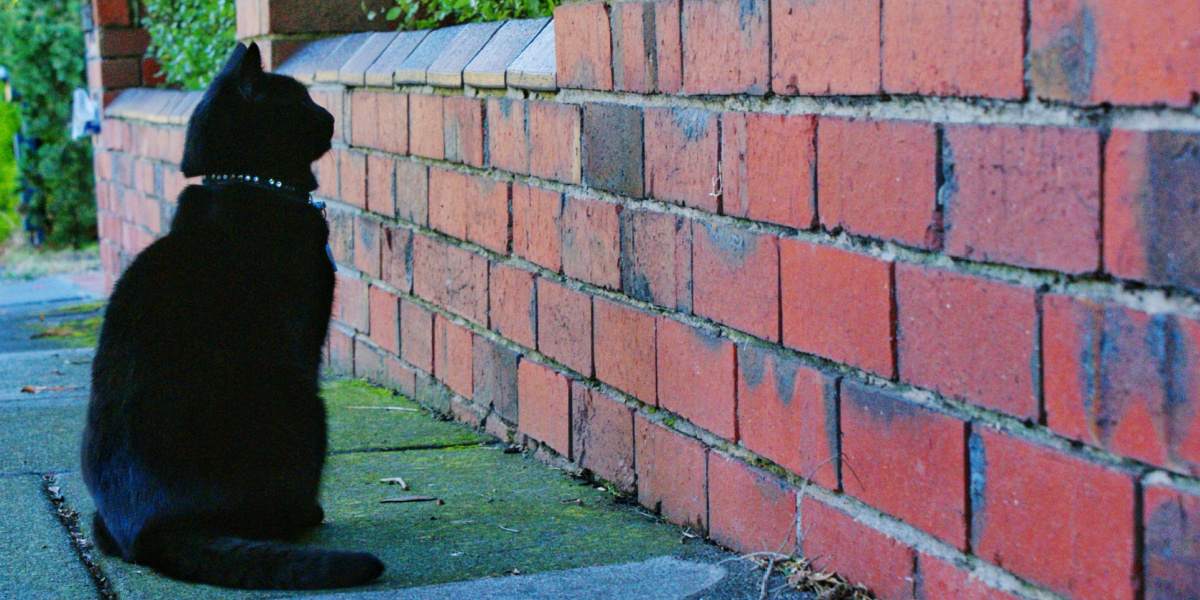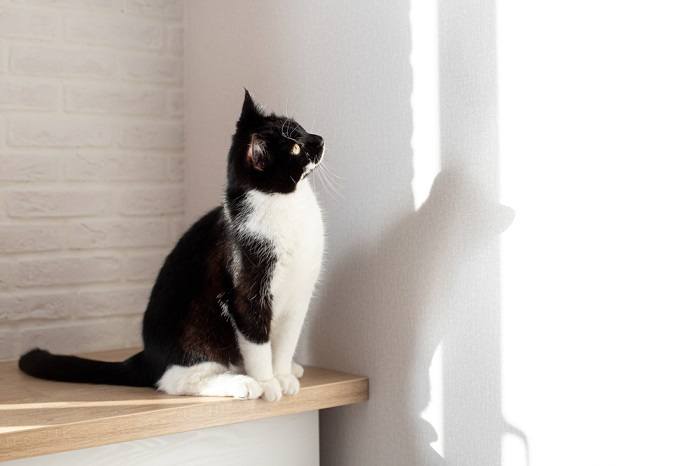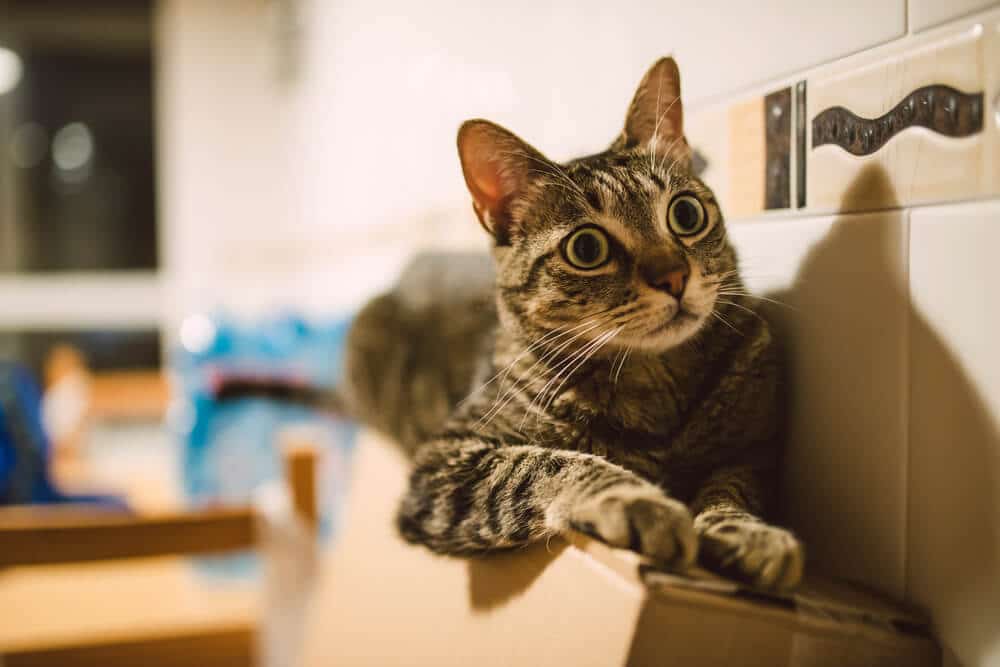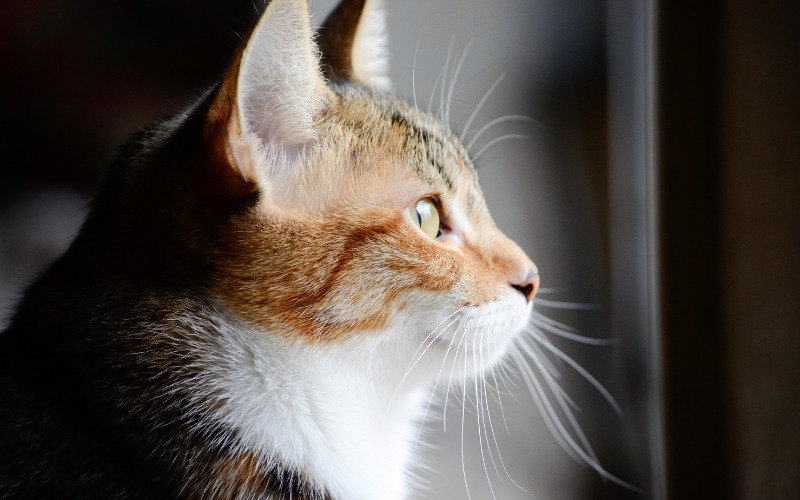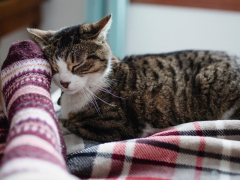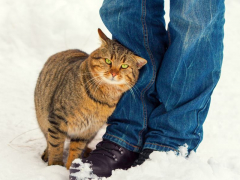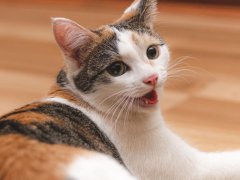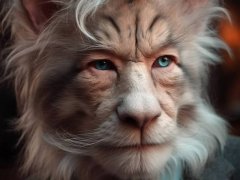It’s an unnerving moment for anyone—you look up to find your cat staring intently at the wall, but there appears to be nothing there! Throughout history, it has been speculated that cats are mediators between the human and spirit realms, but is your beloved pet really seeing ghosts?
Cats have excellent vision, smell, and hearing, so when they stare at walls it could simply be because they can detect something that we can’t. Some medical reasons for starting at walls include feline cognitive dysfunction syndrome (also known as dementia) and seizures. Cats that also press their heads against walls need urgent veterinary attention as this is a sign of several very serious medical conditions.Key Takeaways
Thankfully, there are several other explanations for this perplexing behavior, many involving cats’ superior senses picking up on sounds or movements that we can’t detect. Unfortunately, staring at walls can also be a sign of ill health or aging, so we’ll let you know when to be concerned about this behavior.
Supernatural Powers
Throughout history, cats have been surrounded by myths, superstitions, and folklore:
- Ancient Egyptians believed that cats were spirit mediators, and held them in such high regard that killing a cat was punishable by death.
- A sect of Buddhists believes that when you die your soul is transferred to a cat for “safe keeping” before ascending to paradise.
- In Medieval times, cats were blamed for carrying souls to hell for the devil, as well as hanging out with witches and bringing bad luck.
- Some believe that Norwegian Forest Cats are fairies or goblins in disguise and that peering into their eyes will reveal a magical world.
It’s no wonder, given the mystery that has surrounded cats through the centuries, that some people leap to supernatural conclusions when they see a cat staring at a wall. Read our article about this spooky subject, to help you make up your own mind.
Super Senses
Cats remain very similar to their wildcat ancestors and share the same highly adapted senses to help them navigate their world. Cats are awesome predators and can spend long periods of time focusing on a location if they think there is prey around and it may be very hard to distract them from the task.
Cats also seem to remember where they saw or heard something that interested them in the past, and will return to examine the same spot time after time. These super senses may explain why your cat stares at walls.
1. They’ve Seen Something You Can’t
Mammalian eyes contain different types of photoreceptors called rods and cones on their retinas. Rods are responsible for vision at low light levels, and cats’ eyes have a much higher percentage of rods compared to ours (in fact, at the edges of the retina the concentration of rods in cats’ eyes is more than 5 times higher than in people).
This means that cats can see six times better than us in dim light! They also have a wider field of vision than us, and their eyes are very sensitive to small movements. Most of us find cats’ eyes bewitchingly beautiful, but the elliptical shape, wide pupil expansion, large corneas, and reflective layer on the retina (the tapetum) are functional too, helping cats to see well in near-darkness.
It has been known for many years that some animals such as insects, birds, and fish can see ultraviolet (UV) light (which is beyond the visible wavelengths of light seen by people). A study has revealed that although the lenses in the eyes of several species (including humans) block UV light, many mammals are sensitive to (and can probably see) UV light, cats included.
When your cat is intently staring at the wall it may be that they can see something that you haven’t noticed, especially in dimmer lights —dust particles, a tiny insect, spider, shadow, or even light of a wavelength we can’t see!
Cats must be much closer to an object than we do to see it clearly, which may explain why they sit close to walls when they are staring.
2. They’ve Heard Something Interesting
Their outstanding hearing may make them appear to be aimlessly staring at the wall, when in fact their curiosity has been piqued.
Cats have one of the best hearing ranges of all mammals. They hear similar low frequencies to us but can hear much higher-pitched sounds—up to 64,000 Hertz (compared to 23,000 Hz for people, and 45,000 Hz for dogs).
This may aid cats’ hunting, as prey such as mice use high-frequency sounds to communicate. The shape of cats’ ears amplifies sounds, and they can rotate their ears without even moving their heads to better localize where sounds are coming from.
Cats’ outstanding hearing may make them appear to be aimlessly staring at the wall, when in fact their curiosity has been piqued, and they are listening to sounds from within the wall cavity, or even in your neighbor’s apartment. This could be water trickling through pipes, air rushing through ducts, or a rodent visitor in the wall cavity.
3. They Are Investigating a Smell
Cats have 200 million scent receptors in their noses, 40 times more than people! So if your cat is spending a long time staring at the wall it may be that they have picked up the scent of something in the cavity behind, and are patiently waiting to see what happens next.
4. They Have a Medical Issue
Unfortunately, there are some more concerning reasons your cat may be staring at the wall. Such behavior can sometimes be a sign of aging or ill health.
Feline Cognitive Dysfunction Syndrome (CDS)
Also referred to as “going senile” or having dementia, feline cognitive dysfunction syndrome can occur in older cats as the brain ages. Affected cats suffer a decline in cognitive abilities such as attention, memory, learning, and spatial awareness. It can be hard to distinguish the behavioral changes seen with CDS from other medical issues seen in aging cats, so always book a full checkup with your veterinarian if your cat is showing any of the following signs:
- Changes in activity or responsiveness, e.g., staring at the wall, aimless wandering, or pacing.
- Anxiety or irritability.
- Decreased grooming.
- Loss of previously learned behavior, such as house soiling, forgetting commands, not using the cat flap, staying awake when they would usually be asleep.
- Crying at night.
- Change in appetite.
- Altered interaction with owners.
Feline Hyperesthesia Syndrome
Feline hyperesthesia syndrome consists of trance-like period, sometimes while staring at a wall, in-between episodes of manic behavior.
If your cat is having trance-like periods of staring at the wall in-between episodes of manic behavior, they could be suffering from feline hyperesthesia syndrome. The cause of this unpleasant syndrome in cats is not fully understood, but affected cats often meow or howl loudly, are sensitive to the touch, groom themselves frantically (especially at the tail base), and have enlarged pupils. Various treatment options have been suggested, so contact your veterinarian without delay if this sounds like your feline companion.
Epilepsy
Although many people associate full-body seizures with epilepsy, cats more commonly suffer from partial seizures which can be much harder to recognize. They can manifest as twitches, drooling, abnormal movement, and even growling or vocalizing excessively.
They can also cause affected cats to stare into space, so they may appear to be staring at walls. The symptoms may only occur intermittently, so try to record a video so you can show your veterinarian exactly what happens.
Head Pressing
If your cat progresses from staring at a wall or surface to actually pressing their head against it, you must contact your veterinarian urgently, especially if your cat is also showing other symptoms such as pacing, circling, or seizures. Head pressing can be a symptom of several serious medical conditions including:
- Brain tumors
- Head trauma
- Poisoning (e.g., lead)
- Liver disease (e.g., portosystemic shunt)
- Inflammatory or infectious brain disease (e.g., meningitis)
When Should I Worry if My Cat Is Staring at the Wall?
If your cat stares at the wall only occasionally, ut’s likely nothing to be worried about.
If you’ve spotted your cat staring at the wall, you might be wondering whether to call the vet. The good news is that most causes of wall-staring are benign. However, if your cat is staring at the wall and displaying any other symptoms, they should be brought in for an evaluation.
Also schedule a vet visit if your cat has started staring at the wall and is elderly, as old cats staring at the wall are more likely to be suffering with a medical problem. Lastly, you should call your vet urgently if your cat is pressing their head against the wall as this is symptom of several serious issues.
In Summary
Although seeing your cat staring at a blank wall may make you worry they are seeing ghosts, there are plenty of logical explanations for their behavior. As highly adapted predators, cats have excellent vision, smell, and hearing, so often this behavior is explained by them detecting something that we can’t.
There are also some medical reasons for the behavior such as feline cognitive dysfunction syndrome (also known as dementia). If your cat progresses from staring at the wall to actually pressing their head against it you should contact your veterinarian urgently as this is a sign of several very serious, potentially life-threatening, medical conditions.
Also Read: Why Do Cats Tilt Their Heads?
Frequently Asked Questions
Why is my cat staring at the wall when there is nothing there?
It may be that your cat can see or hear something that you can’t. Cats have much better vision than us in low light, and also better peripheral vision. Your cat may have spotted a small bug or speck of dust that you haven’t noticed.
Cats also have a superior hearing to people, so it may be that they are trying to work out where a sound behind the wall is originating from, such as noise from pipes, air ducts, neighbors, or even mice.
Why does my old cat stare at the wall?
Any senior cat showing unusual behavior such as staring at walls, aimless wandering, loss of toilet training, or personality changes should be taken for a thorough checkup with a veterinarian. They may be suffering from feline cognitive dysfunction syndrome, also known as senility or dementia.
Can cats see ghosts?
Although cats have been associated with the supernatural since ancient times, this is a question that everyone has a different opinion on. Seeing your cat stare into a corner, when there is seemingly nothing there, may lead you to the conclusion that they are seeing ghosts, but in reality, these cats are likely seeing, smelling, or hearing things that we can’t.
They could also be suffering from a medical condition, so ensure that you have them checked by your veterinarian before running for the hills, or holding a séance!
-
www.cats.org.uk
-
www.dvm360.com/view/vision-in-dogs-and-cats
-
www.firstvet.com
-
www.icatcare.org
-
www.msdvetmanual.com
-
www.vin.com/apputil/content/defaultadv1.aspx?pId=11268&catId=32722&id=3866640&ind=79&objTypeID=17
-
www.vet.cornell.edu
-
https://cdn.citl.illinois.edu/courses/ansc207/week2/special_senses/web_data/file6.htm
-
https://www.lsu.edu/deafness/HearingRange.html
-
https://royalsocietypublishing.org/doi/full/10.1098/rspb.2013.2995?rss=1
